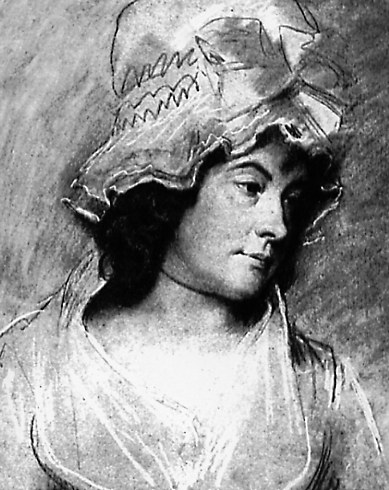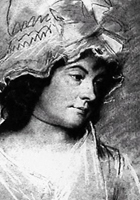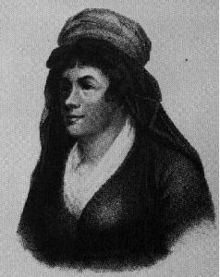Charlotte Turner Smith
Charlotte Turner Smith ( born May 4, 1749 London, † October 28, 1806 in Tilford ) was an English writer, poet and translator of French prose.
Life
Charlotte Smith, nee Turner, arrived on 4 May 1749 London to the world. She was the eldest daughter of the wealthy Nicholas Turner and his wife Anna Towers. After the early death of his mother Charlotte and her sister grew up with an aunt and attended schools in Chichester and Kensington. At the age of 15 years, Charlotte married the twenty-one -year-old Benjamin Smith, son of a wealthy businessman and director of the East India Company Richard Smith. The young couple first lived in the parental house of Smiths in London, but moved to family tensions soon with the children to Lys Farm, Hampshire. Significant inheritance disputes after the death of Richard Smith in 1776 ( he had his grandchildren not hedged clearly enough financially ) should Charlotte and Benjamin burden life. An extravagant life and the inability to manage his paternal inheritance reasonable, Benjamin Smith brought in 1783 for seven months in jail.
1782 and in May 1784, shortly before the release of her husband, some were of Charlotte's poems published ( sonnets in the European Magazine and the collection of Elegiac Sonnets, and Other Essays, enabled at the William Hayley, a neighbor of the Turners, the publication). The very interwoven with mystical melancholy nature descriptions of their sonnet poetry struck a chord with the reader ( The Elegiac Poems were repeatedly re-laid in the following years ). The family lived from the mid-eighties in Dieppe, presumably to escape to the creditors. Charlotte translated Antoine Francois Prévost Manon Lescaut ( 1785), and published a year later, The Romance of Real Life, based on French court records.
Back in England, the Smiths lived with their children temporarily in Midhurst, Sussex. 1787 Charlotte separated from her selfish and indebted husband, who retired to Scotland. The expanded edition of her Elegiac Sonnets (1789 ) had already over 800 subscribers; later, in 1796, Samuel Taylor Coleridge emphasized the importance of Charlotte Smith for the genre of the sonnet. Since she was able to feed themselves and their children not only through the art of poetry, Charlotte published a number of novels that met the then taste, including about Emmeline; or The Orphan of the Castle (4 vols, 1788) or Desmond (3 vols, 1792). Your financial problems could, however, also are not thereby removed from the world, nor the demands of the asset manager of her father - even if Charlotte won the lawsuit in the end, at least for their children shortly before her death.
Charlotte Smith died on October 28, 1806 in Tilford, Surrey, eight months after her husband, the different in the prison of Berwick. Posthumously published collection Beachy Head; With Other Poems (1807 ).
Works
- Elegiac Sonnets (1784 )
- The Romance of Real Life (1786 )
- Emmeline; or The Orphan of the Castle (novel, 1788)
- Ethelinde; or the Recluse of the Lake (novel, 1789)
- Celestina (novel, 1791)
- Desmond (novel, 1792)
- The Emigrants ( poems, 1793)
- The Old Manor House (novel, 1793)
- The Wanderings of Warwick ' (novel, 1794)
- The Banished Man ( novel, 1794)
- Mont Albert (novel, 1795)
- Marchmont (novel, 1796)
- The Young Philosopher (novel, 1798)
- Beachy Head; With Other Poems ( poems, 1807, posthumous)
The novels Celestina, Desmond and Marchmont were translated in the 1790s by Meta Forkel Love Child in the German.










